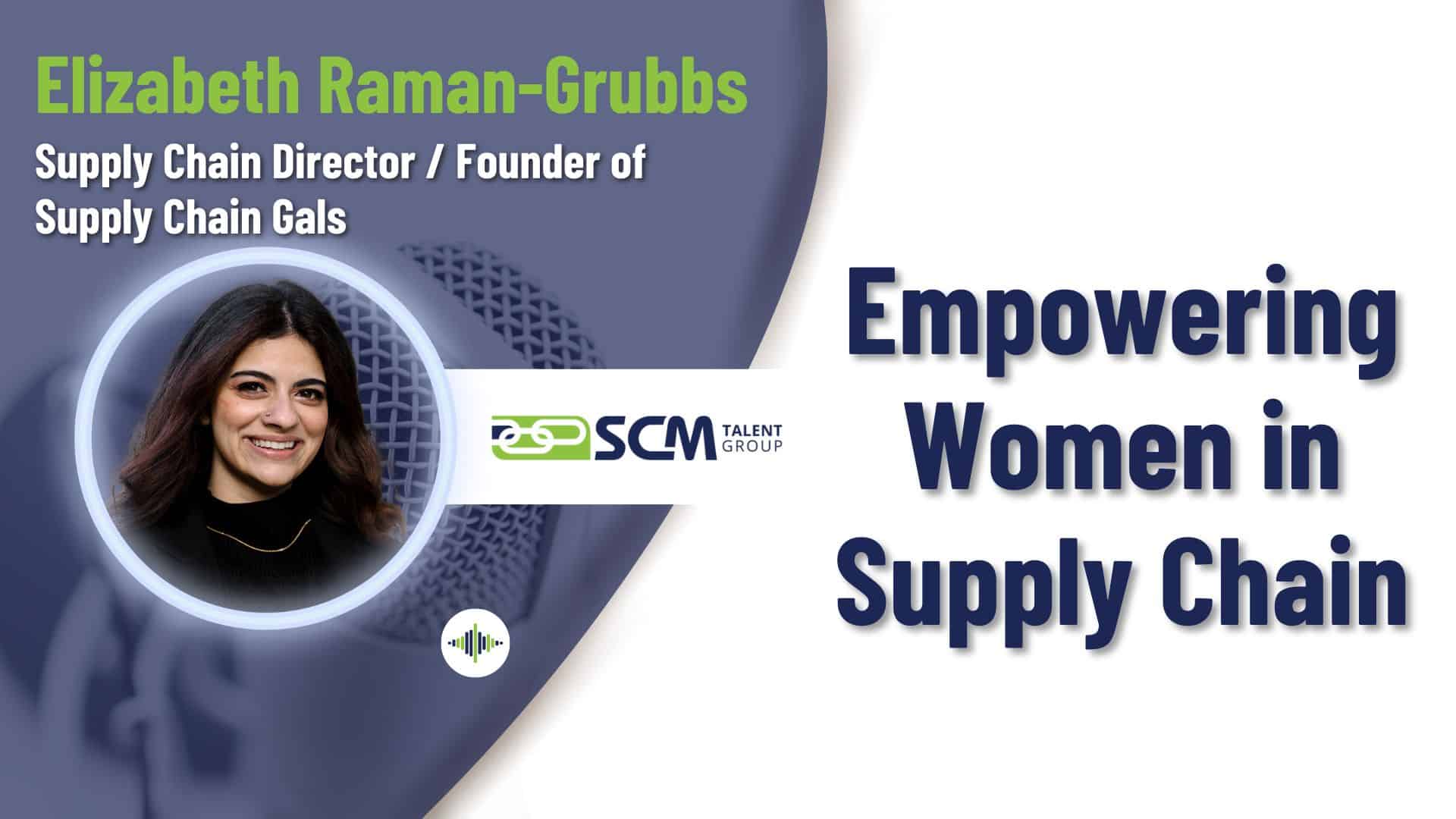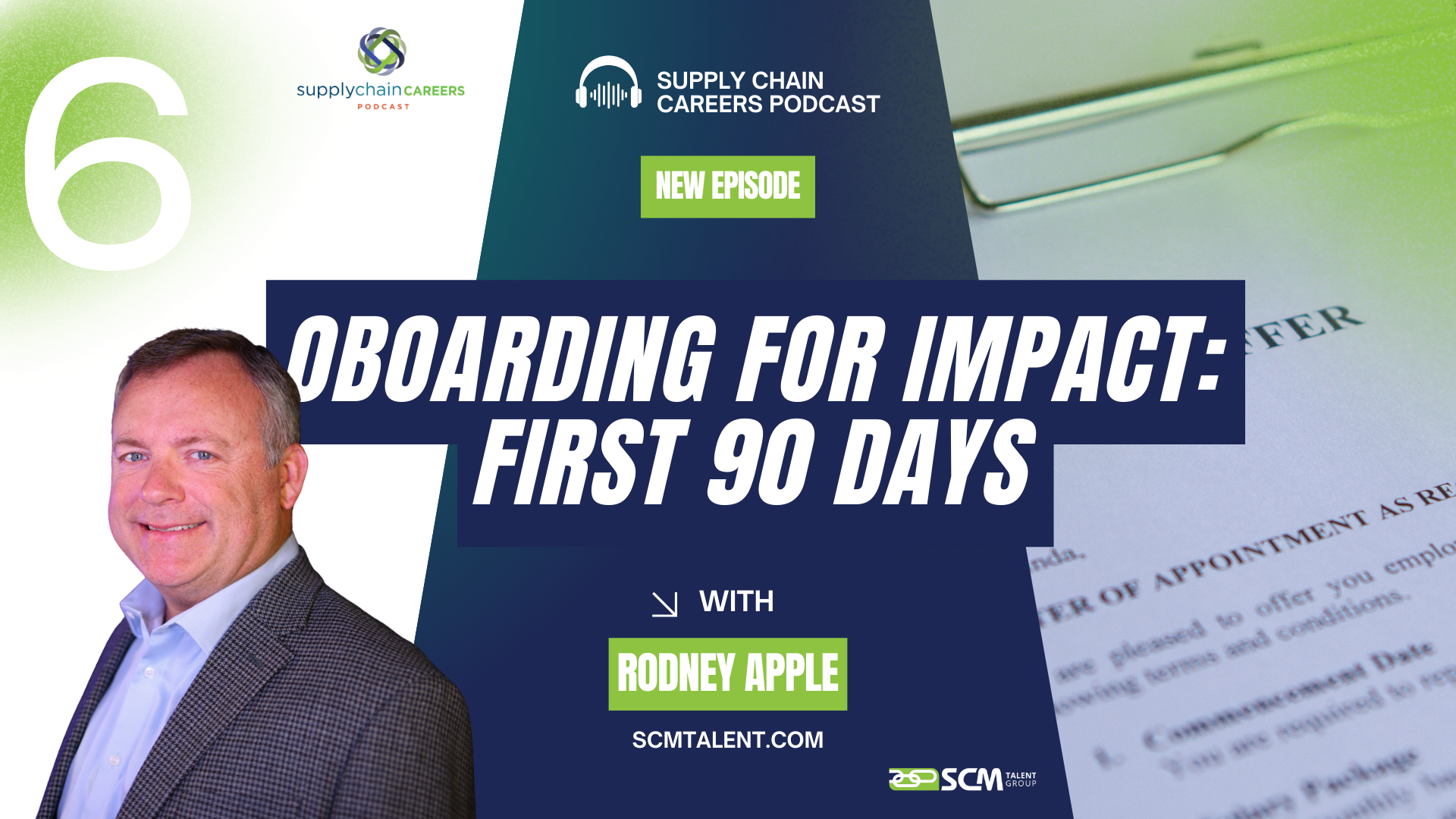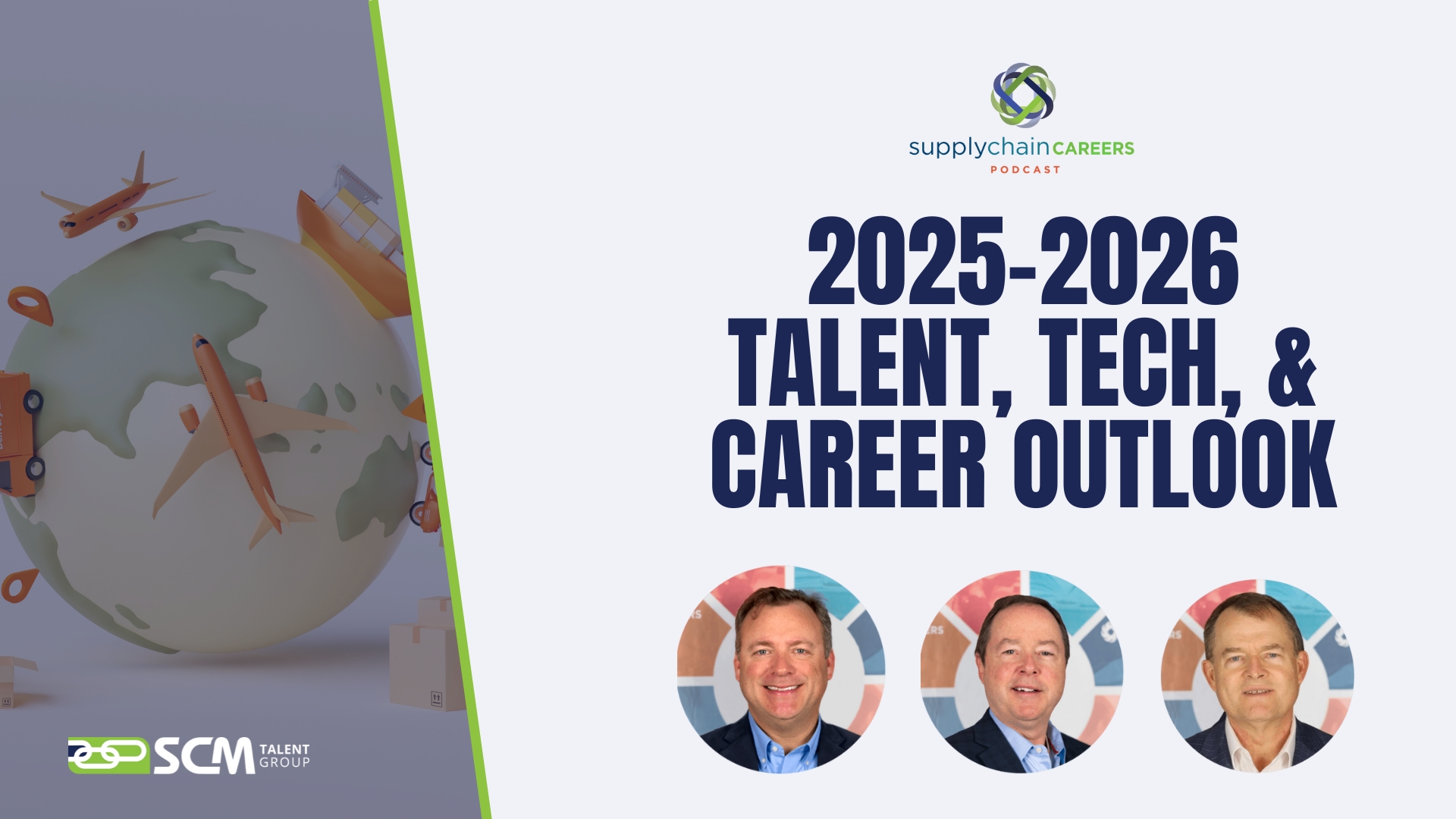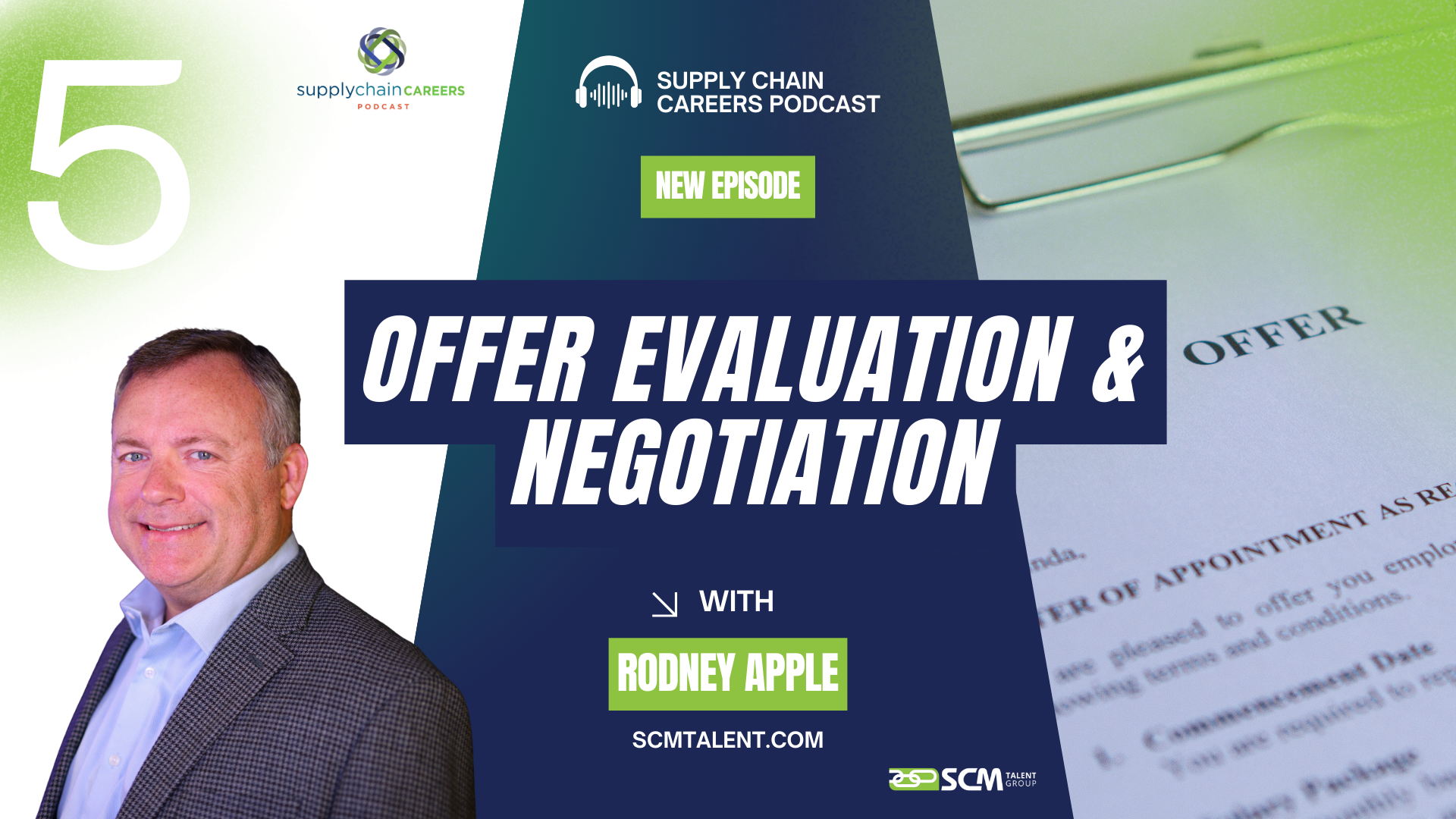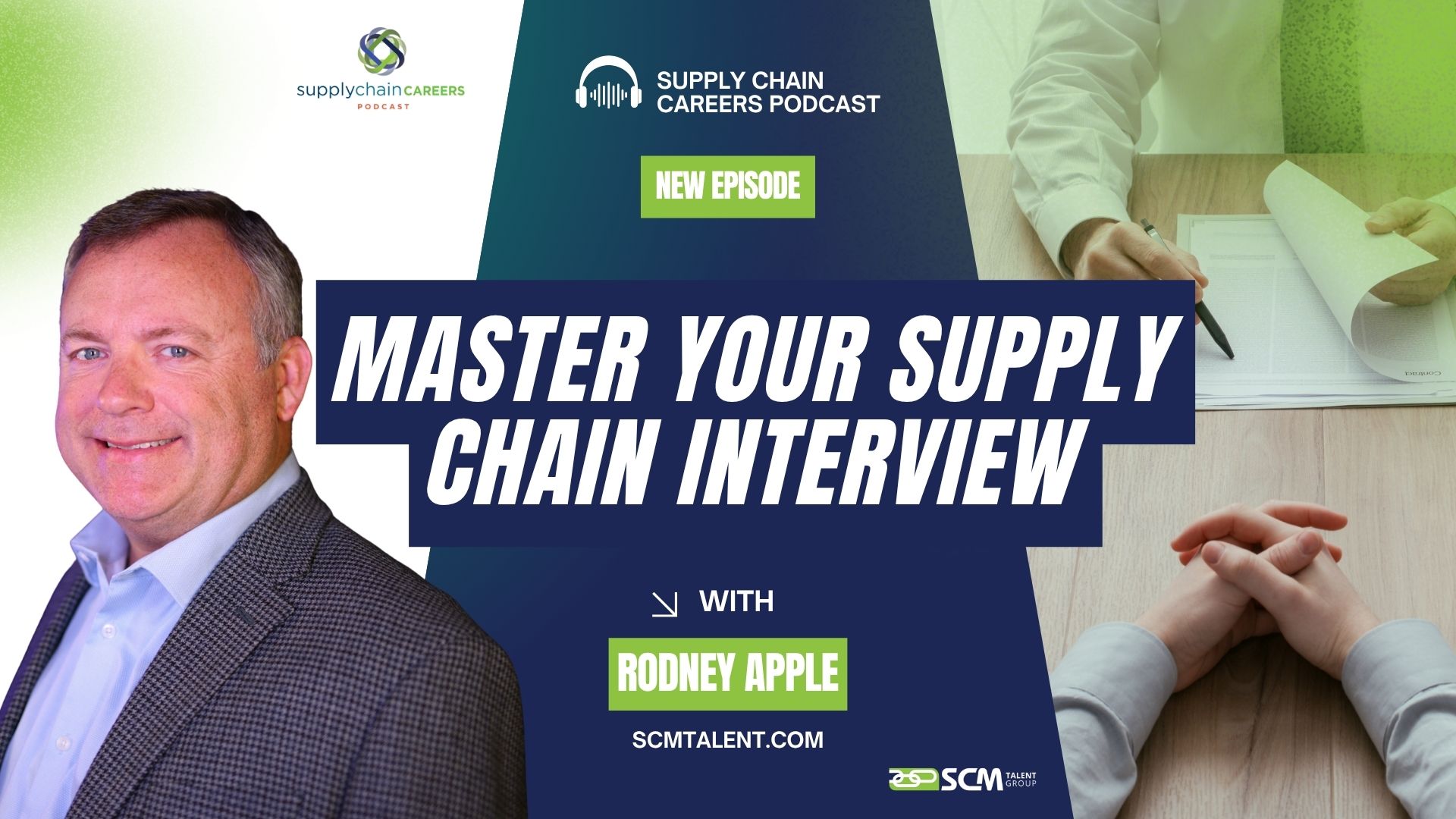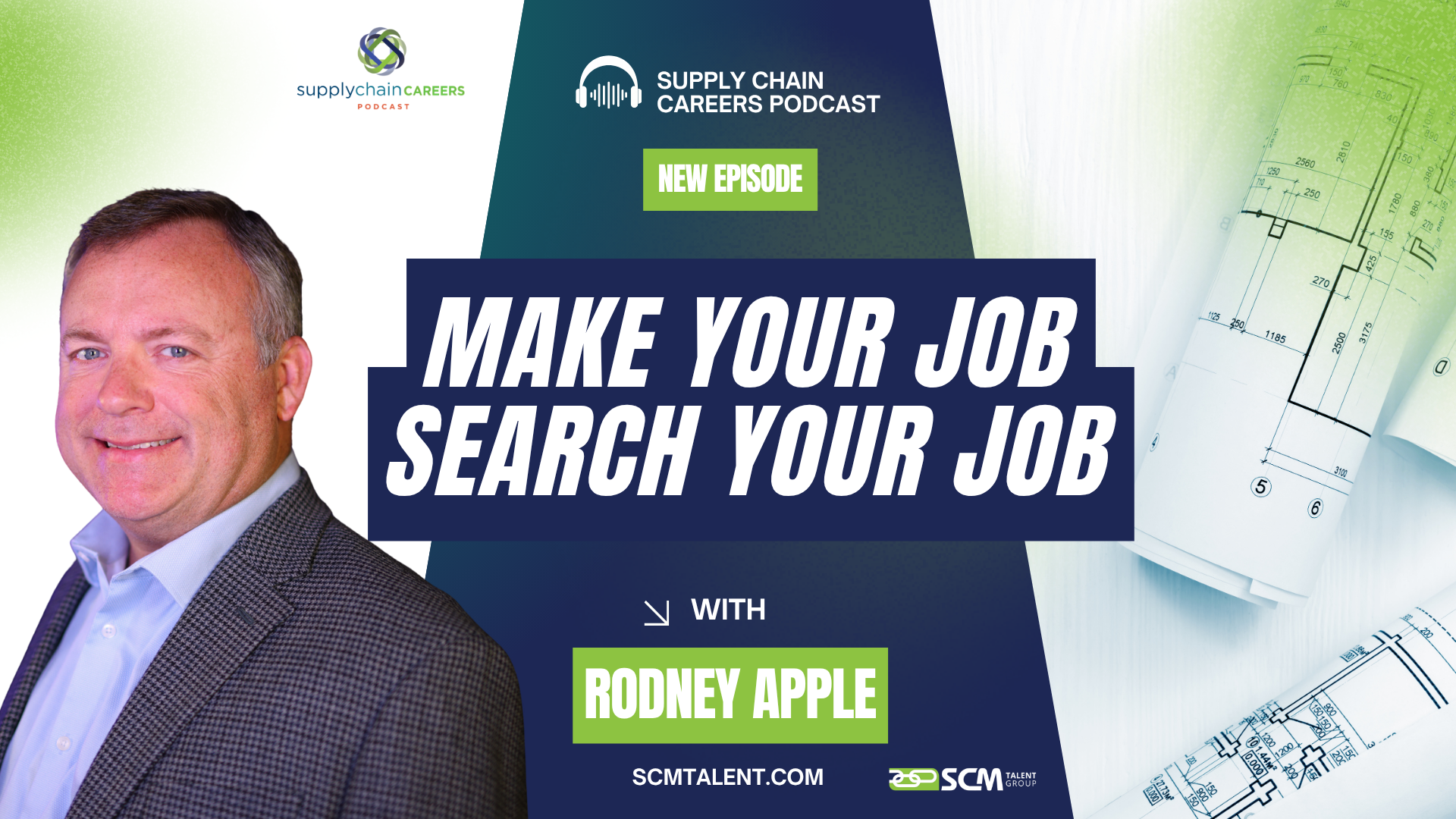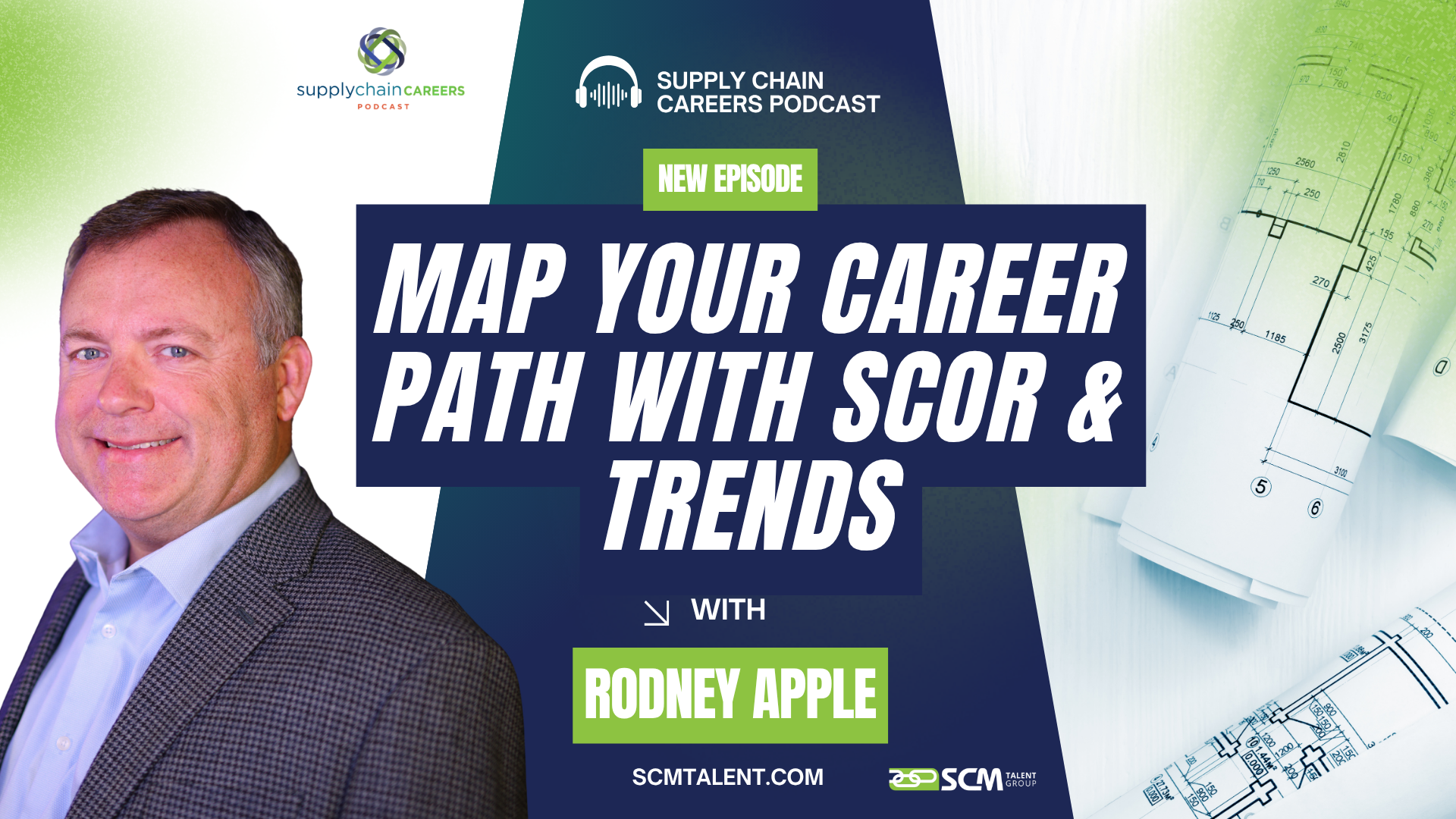[00:00:00] Mike Ogle: Welcome to the supply chain careers podcast. The only podcast for job seekers, professionals, and students who are focused on career enhancing conversations and insights across all aspects of the supply chain discipline. This podcast is made possible by SCM talent group, the industry leading supply chain executive search firm.
Visit SCM talent group at scmtalent. com. In this episode of the Supply Chain Careers Podcast, we speak with Liz Brahman, currently in a position as Director of North American Planning for Women’s Apparel at a large global company. She shares how she got into supply chain after exploring IT and marketing.
Leading to supply chain experience with companies such as Home Depot and her current company. Liz talks about her passion for networking and developing herself and others through mentorship circles. She emphasizes a deep customer focus and doing your best to walk in their shoes. Plus a focus on relationships and understanding others motivations.
Liz also provides strategies for exploring work life balance. And how to pursue continuous improvement, including the value of social networking. She discusses connecting with others and hearing their stories, particularly anyone that sees themselves as an underrepresented voice in their companies. She closes with advice about how to get started toward the solution rather than just identifying problems, plus the value of asking about where you stand and next steps for career growth.
Make sure to check out at supply chain gals on social media such as Instagram, Tik TOK, and LinkedIn.
[00:01:43] Rodney Apple: I’m your podcast co host, Rodney Apple.
[00:01:46] Chris Gaffney: And I’m your podcast co host, Chris Gaffney.
[00:01:49] Rodney Apple: Liz, welcome to the Supply Chain Careers podcast. Thank you for joining us today.
[00:01:54] Elizabeth Raman-Grubbs: Thank you. I’m so excited to be here.
[00:01:56] Rodney Apple: We’re excited to learn more about your career journey. And on that note, we’d love to hear how you got started. What were some of the earliest and inspirations that led you down the supply chain career path?
[00:02:08] Elizabeth Raman-Grubbs: Yeah, I think I honestly got into supply chain by chance. I went to Georgia Tech for undergrad and we have to pick a concentration as business majors.
And I was a person leaning towards IT information technology. And as much as I Wanted to be an I. T. concentration. It just was not for me. I didn’t find it as exciting as I thought I would. So I tried the polar opposite. I tried out being a marketing concentration. My best friend was a marketing concentration.
And again, I found it interesting, but it just wasn’t the right fit for me as super creative. So I love how supply chain, I feel is the best of both worlds where we get to be creative when we’re problem solving and use analytics to solve those problems. So that’s how I got into supply chain.
[00:02:59] Chris Gaffney: Good deal. Liz, I am curious. As you navigated through that, who influenced you, or who guided you? Because that’s typically a critical element of how you sort through some of those different learnings as you’re early in discerning where you want to head.
[00:03:15] Elizabeth Raman-Grubbs: Yeah, my dad took the information technology path, so that’s where that came in to play.
And I would say the professors at Georgia Tech were really great. Professor Myers helped me start the first Undergraduate Operations Management Society Club and was a huge influence and Professor Manpreet Hora did a service operations class and kind of show that it’s not just logistics and supply chain, you also get to be really close to the customer.
So I think those were really my big influences because back in 2013, when I was picking my major supply chain, wasn’t super well known and to be honest, my parents were concerned about me picking that major, if it would have a good job outcomes and turns out it was a great choice. So I’m glad I called my gut there.
[00:04:07] Chris Gaffney: Now, that’s fabulous. Now, you obviously have a pretty strong social media following, and those who follow that you have been associated with some pretty blue chip outfits from undergrad at Georgia Tech, graduate study at MIT, working at Home Depot. I am curious how both your undergrad and your grad background and your first jobs in industry really helped you shape the path to get you to your current role.
[00:04:38] Elizabeth Raman-Grubbs: Yeah, that’s a great question. My first role out of college at Georgia Tech was as a transportation analyst at the Home Depot. And I was lucky enough to switch around and try a variety of different roles in my career, even though I was advised that you really need to pick your niche. And follow that I’ve been able to experiment and data analytics roles and operations roles.
I worked in pricing strategy for a bit and did like customer experience and worked on the digital transformation at Home Depot for the B2B customer. So I think just taking a variety of roles and learning experiences and Applying what I wanted to do next and taking that to move from role to role is really what helps me move around and get to the position I’m in today.
[00:05:31] Rodney Apple: Liz, Chris touched on this earlier, but it’s clear that you have a following and you’re there supporting and educating others within supply chain as well. So we, we appreciate that effort, of course. But serving as a role model for young women that are in business, how do you approach that mentorship, that executive sponsorship within your organization and within other associations that you belong to and support?
[00:05:58] Elizabeth Raman-Grubbs: Yeah. One of my mentors. Early on told me that the biggest regret she had in her career was that she didn’t mentor others as much as she would have liked to earlier on and bring them on along the way. So that’s something that I’ve been really passionate about learning from her words of wisdom there.
And that’s how my social media launched by Liz and supply chain gals was started with that intent to bring people along as I learn, I share. Whatever I can and whatever I know. And I’m also really passionate about being involved within the organizations that I work. We have women’s group where I’m leading a mentorship circle and really passionate about advocating for bringing other women along with me too.
[00:06:43] Rodney Apple: That’s awesome.
[00:06:44] Chris Gaffney: Liz, you have been a pretty agile person through your career. You have done different things, and I think agility is a phenomenal skill that clearly can be developed and honed. I’m really curious, A, what are your thoughts if, as I describe you as someone who’s agile, but also what strategies do you use to stay ahead of the curve?
And as you come into a new industry or a new role, get yourself up to speed as rapidly as possible.
[00:07:14] Elizabeth Raman-Grubbs: Yeah, that’s a great question. I would say my passion really lies and being close to the customer and understanding the customers. That’s something I’ve carried with me throughout all of my roles, whether it was at Home Depot, and I was leading pricing strategy for blinds and storage containers, and now I’m working in apparel.
I You have to really be willing to put yourself in the customer’s shoes and think about what are the pain points when they’re ordering product, they’re experiencing product, and how can you be the person to solve them? And I think thinking about it from that lens, going to the store, seeing how people shop has really helped me unlock how to learn about my industry from the customer’s point of view.
[00:07:57] Chris Gaffney: That’s interesting. And obviously you’ve been in consumer goods for the two big chunks of your career to date, but different types of consumer goods, obviously buying a set of blinds is different than buying a pair of Jordans. What have you seen translate from what’s required to succeed in a place like Home Depot?
[00:08:18] Elizabeth Raman-Grubbs: Yeah, and I’ll give you another example to one of my favorite internships was at Lockheed Martin buying repair plane parts in Marietta, and I think throughout all my roles, I’ve really learned that the key is building relationships with the people you work with and understanding what are their drivers, what are their pain points.
And how can you be the best partner for them and then thinking about what your work impacts at a bigger picture and at a bigger lens and trying to make your work better from that point of view and seeing what are you uniquely capable of unlocking for the bigger business, no matter the product or the industry.
[00:09:03] Chris Gaffney: Demonstrate a lot of self awareness. I think you called out the Lockheed experience. I think one of the key things that I know from an agility standpoint is it connects to confidence. And if you’ve already translated from one environment to another, what I learned at Lockheed was applicable at Home Depot.
It gives you the belief that when I go someplace else, I’m going to have. The same ability to do that. So how do you think, and so I’m going deeper on this question, but how do you think confidence enables that agility or how has. That played into your confidence as you moved around.
[00:09:38] Elizabeth Raman-Grubbs: Yeah, I think something early on in my career that I definitely learned first at Lockheed was it’s never a bad idea to share an idea.
It may not be the right idea. It may not be the answer to everyone’s problems. But I think as I’ve held on to that strategy, I have grown. In confidence as some of those ideas did turn out to be the right idea and I think as you see the impact that you’re able to make with your work, you can definitely follow those patterns of success that you had earlier on in your career and apply them again
[00:10:13] Rodney Apple: and Liz is a follow up. So we talked about. Stretching functionally, working in different roles and functions within supply chain. You’ve touched on a few different industries as well. Could you speak to the acceleration in terms of career advancement moving up? Yeah, you’re at a fairly young age and you’ve reached director level at a, at a very large public corporation.
Are there any particular steps that you took to advance the career? Did you have a kind of a formal career plan that you put together? We’d just love to hear more on that piece.
[00:10:46] Elizabeth Raman-Grubbs: I’ve definitely always been ambitious when it comes to my career. I’ve always hoped to reach a director level positions. I’m very happy that I’ve made it happen.
Something that I’ve always practiced is learning from the people around me. I’ve never been afraid to ask people who are at the senior director level. For example, now, what do you think? Skills helped you get to that position. What do you advise for me, given my skillset, what are the gaps in my experiences and what are some of the learning opportunities that I should reach for to help me get considered for that?
I think the best way you can unlock this mysterious, how do you grow your career path question is to ask people how they did it successfully. And clearly if they did it right, it’s always a good idea to learn from people who have done it correctly.
[00:11:34] Chris Gaffney: Liz, I do a fair amount of coaching with folks in the first portion of their career, and obviously there’s a desire, a need to establish yourself professionally.
People are in this because it’s an area of interest, maybe an area of passion, but the reality is they got to make a living. So in that front end of the career, a lot of times it’s, I’ve got to do whatever it takes to get the job done and to prove myself and then to advance. And I’ve seen lots of folks and all of a sudden, 15 years goes by.
And they really just been consumed by work and many things that we would normally consider to be part of a balanced life have not been on the priority list. Then they spend the next 10 years trying to get that rebalance. And now they’ve got family and external commitments there. Where are you in that kind of thought around?
What work life balance means for you now, and how do you consciously try to draw your lines so you’re effective at work, but also healthy, balanced, engaged as you choose to be in the outside world?
[00:12:38] Elizabeth Raman-Grubbs: Yeah, this is a really tough one because As much as I’d like to say work life balance exists, you can have 50 50 priorities.
Sometimes I think work life takes over, and sometimes I think the balance part of your life takes over, depending on which situation you’re in. I think that is definitely okay, as long as you are like shifting between the two. So I think that’s one thing I take in mind if my life is chaotic, then maybe I’m not going to ask for an extra project right now or an extra responsibility.
But if my life is pretty easy going, then I have that extra bandwidth to take things on a good rule. I like to follow too at work. Is the 70 2010 role spend 70 percent of your time doing your job really well 20 percent of your time growing your network meeting people learning from people because that could unlock things for you and then 10 percent of that time learning new skills trying new things maybe.
Furthering your education. So I think that has put things in perspective for me too, and helped me keep time gates or boundaries on my time and make sure I’m using it as effectively as possible.
[00:13:51] Chris Gaffney: Being general, not specific. When you look at your peers and the people you interact with who are in the same, if I would say era as you, how did, how did you see them struggling or not around work life balance?
What do you, what’s your advice to others when they talk to you about getting it in a place that works for now?
[00:14:10] Elizabeth Raman-Grubbs: Yeah, I think. If you’re struggling with work life balance, the easiest way to try and get right back on track is really to block out your time and create some kind of routine for your work week, your weekend and think about maybe Sundays are the day that you’re setting your priorities for the week and what you can realistically achieve instead of.
Letting things pile on, um, because I think that’s where it can get chaotic. If you think that you can realistically take on too much instead of boxing out, here’s my priorities. And if I do anything beyond this, this is like a win or a plus.
[00:14:45] Rodney Apple: So shifting gears and it’s clear you’re a continuous learner.
You have a large network that you’ve developed, which is awesome. I think that’s very important for advancing one’s career. But I’m sure you’ve been exposed to a lot of really cool technology as well, and you’re keeping a pulse on what’s going on within supply chain. What are you seeing out there? What are some of your predictions for the future of supply chain?
After several years of ups and downs and lots of disruptions upstream, downstream, across all industries, love to hear your perspective.
[00:15:17] Elizabeth Raman-Grubbs: Yeah, I think we’ve seen a lot of technology advancement, even since I started my career till now. And I think that’s going to definitely keep going. Even in the past few years, we’ve seen so much happening with artificial intelligence, and I think the supply chain industry will continue to embrace that and think about.
How can we make better, smarter, faster decisions earlier on in the supply chain to mitigate risk and mitigate costs. And I think for us, that means being flexible and who can adapt and really embrace that technology to make their role, their company more efficient, more effective are the ones we’re going to win out in the long run.
[00:15:59] Chris Gaffney: Liz, I am curious, as we are all trying to be continuous learners, you are. Adept in the world of social media, and that’s probably being pretty humble about it. It’s something you’re very intentional about. What role does social media play for you in your own supply chain, learning, career development, exploration, and what advice do you give others in that space?
[00:16:26] Elizabeth Raman-Grubbs: Yeah, I think social media gives us an advantage that maybe we didn’t have prior just to connect with people beyond our immediate circle, our immediate world, who we work with, who we interface with on a day to day. And it’s definitely a huge learning opportunity where you can see someone’s day in the life or hear someone talk about how they approach their performance reviews.
So I definitely take advantage of. Just that free education of learning from other people. Like I said before, you don’t know if you don’t, what you don’t know, but if you have the opportunity to share with other people or to learn from them, I would definitely take advantage of it. And I love seeing all the focus on supply chain coming up in social media and just giving more visibility to different career paths and opportunities.
That’s something I’m definitely working on highlighting with supply chain gals. We’re featuring women and. They’re different roles and career paths are taking just so people have visibility, because maybe that would be your interest in the big range of supply chain. And you wouldn’t have ever known it if you’d never were exposed to it.
So I think social media is a huge unlock for us to share information and you should definitely take advantage of it.
During this short break, we recognize that this podcast is made possible by SCM Talent Group, the industry leading supply chain executive search firm. Visit SCM talent group at SCM talent.com
[00:17:54] Chris Gaffney: com. Yeah. I’ll follow on to that one because I am curious and I’ll say you’re an influencer, but in the most positive way, right? All the positive attributes of that, how’s it, who’s reaching out to you that surprised you? Right. You may have said this is who I assumed I was going to try to interact with and I’m hitting that audience, but are there other audience that you say, wow, these people are coming at me obviously have interest or need.
I didn’t expect
[00:18:23] Elizabeth Raman-Grubbs: that. Yeah, I initially started my social media because my little sister was. Having trouble finding her first job, and I realized she never learned in college how to write a resume or go through the interview process. And so I was thinking, this was back in 2020, how many people are coming right out of college right now without the tools they need, especially women.
to start successful careers. So I originally thought I was going to meet people who want to hear about how to make a strong bullet on your resume. And that’s it. That’s like where the conversation would end. So I was surprised at how many people I met with who work in supply chain. I’ve gotten a message saying you make supply chain cool.
And we, we love it having that visibility to our industry. So that always surprises me. And just like the genuine connection where people will tell me their scenario of what’s going on at work and we’ll talk through it and they could be starting out their career. They could be mid. Level on their career.
And I’ve also connected with people who’ve been longer, further along in their career than I have. I think social media really breaks down the barriers of who you would talk to in real life, because it levels the playing field, which has been really amazing. That’s really been my favorite part is connecting with people and being able to talk and have that real personal relationship
online.
[00:19:50] Chris Gaffney: Yeah, that’s huge that you you’re able to have that impact. And Liz, I want to touch
back on women in supply chain because Chris and I’ve been around the supply chain block for quite some time and it has transitioned from heavily male oriented space into where we’re having a lot more females come into the mix over the years.
But any, you feel like that you’ve helped expose other women into the field of supply chain to include your thoughts on women entering more into leadership roles and into the C suite in general. Yeah,
[00:20:24] Elizabeth Raman-Grubbs: I think there’s been a lot of progress for women in supply chain lately, but we still have a ways to go.
Something I learned at Georgia Tech was I was part of the women’s recruitment team there. So we actively tried to increase the ratio of women’s students at Georgia Tech and we broke history that the year I was on the board raising the ratio past 40%. So it really is true that if you can see it, you can be it.
And I think. Having the connection and showing visibility to the women that are out there in supply chain, they’re out there and maybe they’re just not getting as much visibility to the up and coming generation as they need to be to help increase those opportunities for minorities and increase diversity and supply chain.
So that is something I’m really passionate about and really hopeful about for the future.
[00:21:21] Chris Gaffney: If somebody is an advocate for women in supply chain, say some old guy like me, what would be the one thing that you would say? Here’s something you could do if you really want to be an advocate to help women advance in greater ways and greater levels in leadership and supply chain.
What’s the one thing?
[00:21:42] Elizabeth Raman-Grubbs: I think you’re already doing it, and that would be connecting with people who aren’t like you and hearing their stories, hearing their perspective. That’s something I try to do is, yes, it’s easy to connect with people who have similar backgrounds to me, but I often learn the most from connecting with people who have very different backgrounds than me.
And I think you’ll be surprised about maybe the fears or concerns or barriers to entry and you could be a huge unlock for those people just coming from a different point of view, a different perspective. So I think that is something really great to do.
[00:22:19] Chris Gaffney: Thank you for that. Really helpful. A question for you.
You, you have. Lots of runway in front of you, but you’ve done some things that I know you and your family are probably proud of. You probably surprised your parents say, hey, there’s actually some pretty cool stuff in the world of supply chain. But if you go back to those early days, you can go back as far as you want, but probably at least early in college.
You have a perspective now you didn’t have then. So if you had to write yourself a letter back then and put some key advice in there to your younger self about navigating what you’ve seen between then and now, what couple things might have been helpful for you to know?
[00:23:01] Elizabeth Raman-Grubbs: I think when I first started my first job out of college, I had a lot of misconceptions on definitely on perfectionism.
When you’re in college, you’re getting a great what’s expected of you and you’re checking off the outcome and moving along your way. And something that really surprised me when I entered the workforce is there’s no one right way to approach a problem. There’s so many different ways and you’re going to make mistakes as you go along the way.
Everybody makes mistakes and that’s okay. Sometimes you’ll learn more from those mistakes than you would have doing it perfectly the first time and knowing everything along the way. So I think that’s the advice I would definitely give to myself earlier is there’s. Tons of ways to do things, try it out, experiment, learn, don’t be afraid to fail and also hold on to that confidence and that optimism that you have in your first job and carry it with you because the world does have a lot of possibilities for you.
And I think the further along in our careers, sometimes we lose that mindset that anything is possible for us. So I think that’s a really big strength you can carry.
[00:24:09] Chris Gaffney: Yeah, I’ll give you one because I’ve answered this question a number of times and there’s always this spectrum of people who think about their tolerance for risk and the best advice I’ve received recently that I would have put into my note to my younger self is you can actually take a little more risk than you might think.
Realize that you can, particularly if you’ve got that infrastructure around you, that support system of mentors and that type of thing. You’re in a field that is having tremendous growth. So whatever that risk may look, it may not go crazy. You don’t have to jump out of a plane. With or without a shoot, just move your risk tolerance just a little bit more, and you may tap into some amazing opportunities.
I look at folks that I went to school with, and we’ve been very fortunate for those who went to a school like Georgia Tech, but they’re folks who have done phenomenally well, and they just took one more risk. And so that might be something. I’m curious your thoughts on that. You’re pretty progressive, and you’re pretty bold, but what are your thoughts on that?
[00:25:13] Elizabeth Raman-Grubbs: I think that’s really great advice. I’m definitely going to carry that with me in my career. I’ve never thought about it that way, but I would say I am generally a risk taker. I do swing big or propose something and just see if it lands. So that definitely resonates with me.
[00:25:31] Rodney Apple: And as a follow up, Liz, we talked about work life balance. We’ve talked about career advancement. We have our time at work is a good third of our life. We have our personal life and things in that nature, and we sleep the other third. But how do you define success, both professionally and personally? And how are you balancing that success ratios across those different aspects of your life?
Yeah,
[00:25:57] Elizabeth Raman-Grubbs: I’ve been thinking about this a lot lately, just because it’s a new year coming end of the year wrapping up. So I think it’s a really good question. And I would say across personal and professional, I measure success by the impact I’m able to make on people. So do I leave things better than they were when I got there?
Do I make a difference in people’s personal lives, their work lives? Am I making things easier for the team to get projects moving? Am I helping people unlock their career path through social media? Because I think at the end of the day, that’s really what matters is the relationships we have with people and if we’re able to make a positive impact for them.
[00:26:42] Chris Gaffney: Liz, you mentioned that you’ve had some great resources while you were in school, and I know some of your mentors in the industry side of things. I’m curious if there are 2 or 3 pieces of advice that you’ve received that have stuck with you and have been very helpful. To you, maybe who that came from, if you’re open to saying who it came from, and then when you talk to others, what are the one or two pieces of advice you give them if they’re interested in a career in supply chain?
[00:27:11] Elizabeth Raman-Grubbs: Yeah, I have definitely received a lot of great advice in my career. One that really sticks with me is when I was an analyst at the Home Depot and I. Was working in Michelle Livingstone’s department at the time who was previously on the podcast. She was the VP of transportation. And for some reason I had 30 minutes with her as an analyst.
And I remember I thought I brought something so smart to her. I brought this whole problem and I was going to share her the problem. And she doesn’t remember this. We talked about it, but it was super impactful for me. But she said, okay, what are you going to do next? What are you going to do about the problem?
And that was just a huge kind of unlock for me that it’s not about the problems that we face. It’s about what you’re going to do next in your personal life and in your professional life. It’s better to think about the solution instead of spending all your time thinking about the problems that was really impactful for me.
[00:28:13] Chris Gaffney: I like it. I like it a lot. Now to you share that piece with others. So there are other things that you share with others who are thinking about getting into this crazy world of supply chain.
[00:28:23] Elizabeth Raman-Grubbs: Yeah, I would definitely share that with others. And another piece of advice that I often give on social media is don’t be afraid to ask the worst.
Someone could say is no. I feel like a lot of people have anxiety in their mind of, well, I get promoted this year. Am I able to get a higher salary? Will I be able to get on this project? You may as well ask and see what people would think. And then at least where you stand and where the steps are, where you can close the gap if you’re not there yet.
It doesn’t hurt to plant that seed in other people’s minds that you’re ambitious, you’re hopeful, you’re excited about your future and you’re passionate about it. So I always say, you may as well ask.
[00:29:05] Chris Gaffney: That’s a good one. That works at work and it works at, outside of work. I’ve always, I learned from a great procurement person.
They said, you got to collect a no. And the only way to collect a no is to ask. And most times when you ask, you can probably get a yes. So I like it. I love it. Speaking of asking Liz,
[00:29:25] Rodney Apple: it was such a large following in social media. What are some of the, if you had to break it down to top 2 or 3 things that you’re asked by your followers, especially as it relates to careers and supply chain?
I guess we’re really anything in supply chain. What are you hearing the most often?
[00:29:42] Elizabeth Raman-Grubbs: Yeah, lately, it’s always a mix, depending on the time of year and what everyone’s going through. Lately, I would say I get a lot of questions about how can I get into supply chain because it seems like an amazing career path, which is really great to hear.
And I also get a lot of questions definitely about how can I grow my career in supply chain? How do I further my impact? How do I become a people leader one day? Which is also really exciting to see everyone sharing their ambition about the industry and getting really excited about it.
[00:30:16] Rodney Apple: That’s wonderful.
It’s very exciting to hear that.
[00:30:18] Chris Gaffney: Liz, is there anything we haven’t asked you that you think would be beneficial for the folks who were going to hear the podcast?
[00:30:25] Elizabeth Raman-Grubbs: I think probably maybe they’d like to hear More of your perspective on maybe me or more advice from being on the other side of the career path, you know,
[00:30:39] Chris Gaffney: Liz, you have shared some wonderful information that has been helpful to me, and I know will be helpful to our audience.
And we are hopeful that. Your reach will get this podcast into a greater number of folks hands and one thing I would say to you, the perspective that I offer, I say to people, I came into the field of supply chain. We didn’t even call it supply chain and it was the analog world and what I have been really excited about in the last 10 or 15 years as we’ve understood the promise of the digital supply chain.
Coming to us, it’s here in pieces and parts, but we’re just scratching the surface the opportunities that exist in supply chain for folks who desire to go into this field hard work. Sometimes behind the scenes. Sometimes you don’t get all the glory. But are really exciting over the next 20 to 25 years, and I think they will be personally rewarding, but I also think people who go into this field have the opportunity to have a big impact on commerce, society, creating better jobs for folks.
I think there are really some big things there, so I really would encourage you as you go forward to be bullish, be positive, and as you bring people along with you, provide that perspective to them. If you could, yeah, I love that.
[00:32:05] Rodney Apple: Yeah. And I’ll echo regardless of the technology advancements. One day we have the lights out warehouses.
It’s still a people business and people run the supply chain. Computers can’t solve all the problems. Having recruited into space across all industries for. 20 plus years, I think, from my perspective, it’s and yeah, I’m going to show some bias here, but I think it’s 1 of the best career paths you can possibly choose because of the breadth and the depth of areas you can go into with different skill sets, different functions, different industries.
They all are slightly different when it comes to supply chain management. So I’ll offer that up that it’s probably 1 of the best times to get into the field now than ever before.
[00:32:48] Elizabeth Raman-Grubbs: But not agree more. That was great advice
[00:32:51] Rodney Apple: for our audience that may not be familiar with you yet. Uh, we would love to hear from you, like, where they can find more information and perhaps follow or subscribe.
Um, to your social media channels.
[00:33:04] Elizabeth Raman-Grubbs: Yeah. You can find me at launched by Liz on Instagram and take talk. And also my organization at supply chain gals across Instagram, tick tock and LinkedIn.
[00:33:18] Rodney Apple: Awesome. Liz, it’s been a pleasure speaking with you today. Thank you so much for sharing your time and sharing your perspectives on careers within supply chain management.
[00:33:28] Elizabeth Raman-Grubbs: Thank you so much. I really enjoyed it.
[00:33:34] Mike Ogle: Thanks for listening to this episode of the Supply Chain Careers Podcast. Be sure to listen to other episodes and sign up to be notified when future episodes are released. As we continue to interview industry leading supply chain experts. This podcast is made possible by SCM talent group, the industry leading supply chain executive search firm.
[00:33:57] Elizabeth Raman-Grubbs: Visit SCM talent group at scmtalent. com.
